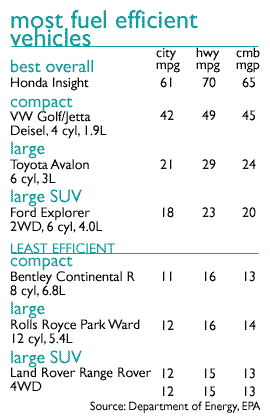|
Muzzle the gas guzzler
|
 |
March 27, 2000: 6:15 p.m. ET
Fuel-efficient vehicles can take sting out of climbing pump prices
By Staff Writer Rob Lenihan
|
NEW YORK (CNNfn) - When it comes to car buying, fuel efficiency may not be on everyone's mind as the booming economy shifts people's attention to size, looks or brand name. But with the recent hikes in gasoline prices, maybe you want to add fuel efficiency to your new car checklist.
What's in it for you? How about money saved and a cleaner environment?
The U.S. Department of Energy said choosing the most fuel-efficient vehicle in a class could save you more than $1,500 in costs and prevent over 15 tons of greenhouse gas pollution over the lifetime of your vehicle.
The department maintains you do not have to sacrifice utility or size to make a difference, as there are ranges of fuel economy within the same vehicle classes.
The agency's Fuel Economy Guide lists the most fuel-efficient vehicle in each class and gives consumers tips on how to save fuel and money.
An Insight for Sore Eyes
The Department of Energy and the Environmental Protection Agency rated several classes of vehicles on their joint Web site, giving the overall best fuel-efficient title to the Honda Insight, which gets 61 miles to the gallon in the city and 70 on the highway.
The two-passenger Insight, priced between $18,000 and $20,800, is a "hybrid" vehicle, so named because it combines a gasoline engine and an electric motor to reduce fuel consumption. Other vehicles in this class include the Precept from General Motors Corp. (GM: Research, Estimates), the Prodigy from Ford Motor Co. (F: Research, Estimates) and the Prius from Toyota, which is scheduled to go on sale in the United States in July.
Also getting high marks on the fuel efficiency list were the VW New Beetle Diesel in the subcompact class, which got a combined 45 miles to the gallon; the Dodge Caravan in the minivan class, which got a combined 22 miles; and the Chevrolet Tracker in the small sport/utility vehicle class, which pulled in a combined 26 miles per gallon.

The least fuel-efficient vehicles included the Bentley Arnage in the mid-sized class, which posted a combined 13 miles to the gallon; the Dodge Dakota 4WD in the standard pick-up class, which pulled down 13 miles to the gallon; and the VW Eurovan in the minivan class, which got 16 miles to the gallon.
Gabriel Shenhar, senior auto test engineer at the Consumer Reports auto test facility, said the Toyota Corolla and the Chevrolet Prism both tested well, getting about 30 and 31 miles to the gallon respectively in overall mixed highway and city driving. Both vehicles sell for around $16,000 each.
The Honda Civic also got over 30 miles to the gallon, Shenhar said, but a redesigned version of the car is scheduled for release in the fall.
Fuel me once
Not in the market for a new car? Okay, then there are some basic steps to take with your current vehicle. The National Motorists Association and the Department of Energy said these steps include:
· Keeping your tires properly inflated.
· Driving at even steady speeds.
· Making sure not to warm your engine at idle for long periods of time.
· Using air conditioning sparingly and in re-circulation mode whenever possible.
· Avoiding speeding, jackrabbit starts and hard breaking.
The motorists association also suggested using synthetic motor oils, which although more expensive, last longer and reduce friction within the engine. Reduced friction means improved fuel economy.

The oxygen sensor, which regulates the air fuel mixture, takes all the grief from the hot exhaust gasses in the engine manifold. The sensor will not die on the spot and will linger in a functional stupor for a long time, the association said. If you have more than 50,000 miles on your car and you have not replaced your oxygen sensor, you may want to give it a try.
Just driving slowly will not guarantee maximum fuel economy. Engines have a range where they are most efficient and driving in that range will deliver the best fuel economy.
Under lab conditions, your car might achieve its best mileage at 43 mph, although this is not practical for highway driving. You may get the best mileage on the highway if you hold a steady speed of 65 or 70 mph and you may use more fuel driving faster or slower than this speed. Much of the advantage will come from driving a steady speed in sync with the rest of traffic.
Fuel Me Twice
Of course, if recent vehicle sales figures are any indication, consumers are not losing much sleep over whether they should buy a fuel-efficient vehicle or not. Autodata Corp., a Woodcliff Lake, N.J.-based consulting firm, reported that vehicle sales for February were up 11.8 percent from the year earlier. March figures are due next week.
"There's been no stopping trucks," said Bill Seltenheim, the firm's vice president. "We don't see any evidence that oil prices are slowing car or truck sales."
Shenhar from Consumer Reports had a similar observation.
"From the data we see, (fuel efficiency) is not the No.1 consideration," he said. "Very often it's not even a second one. Fuel economy is several items down the line." 
|
|
|
|
|
 |

|

